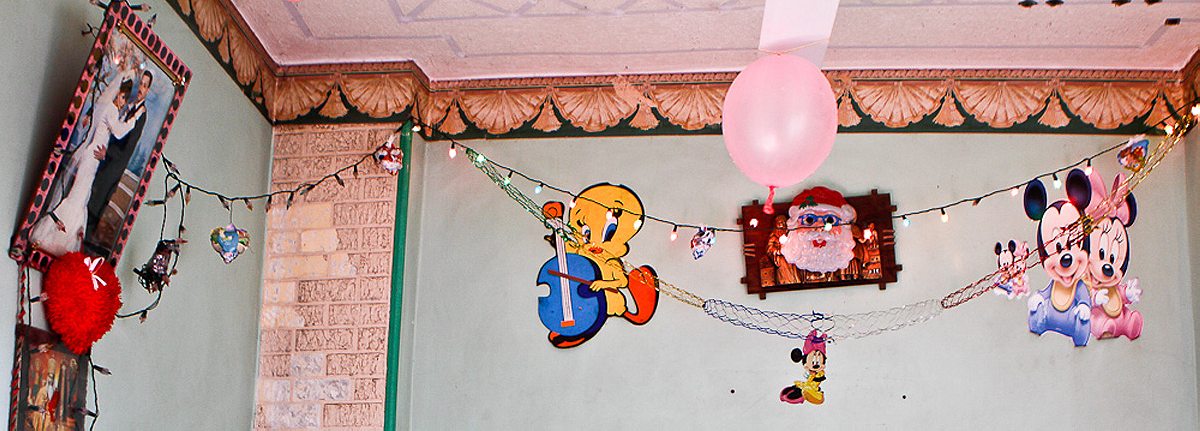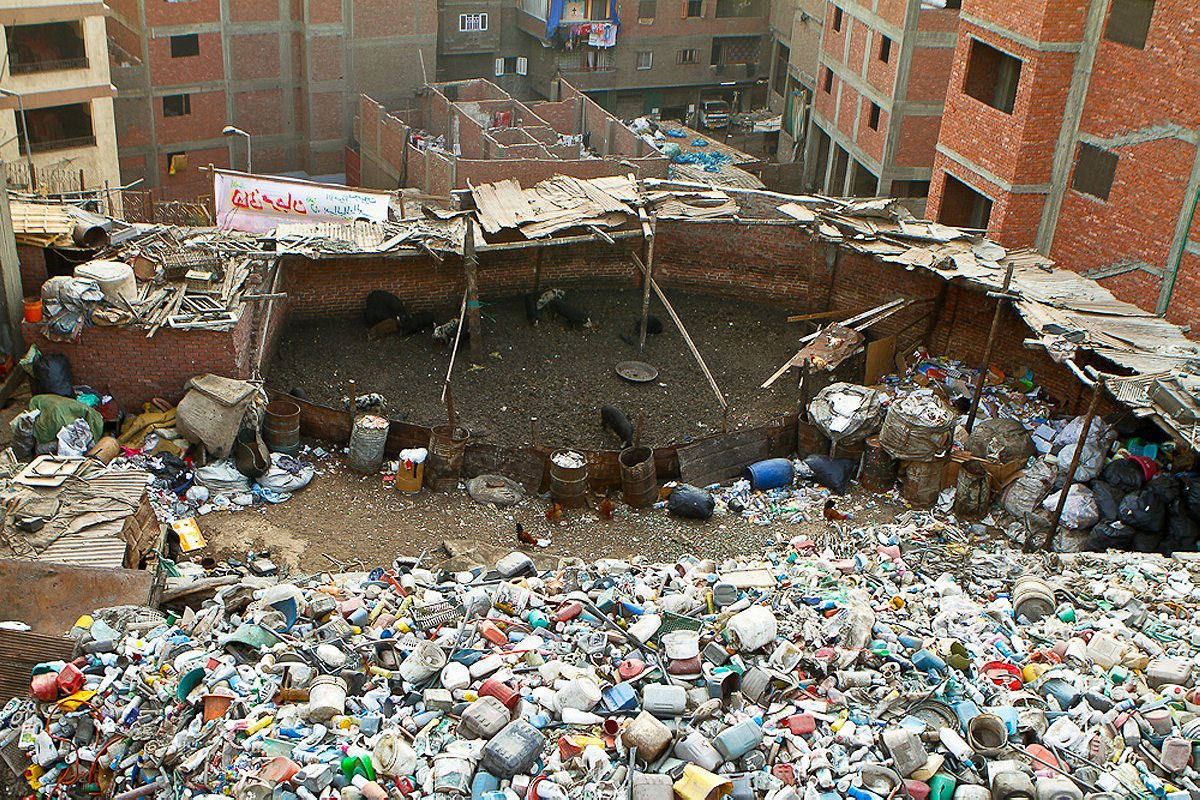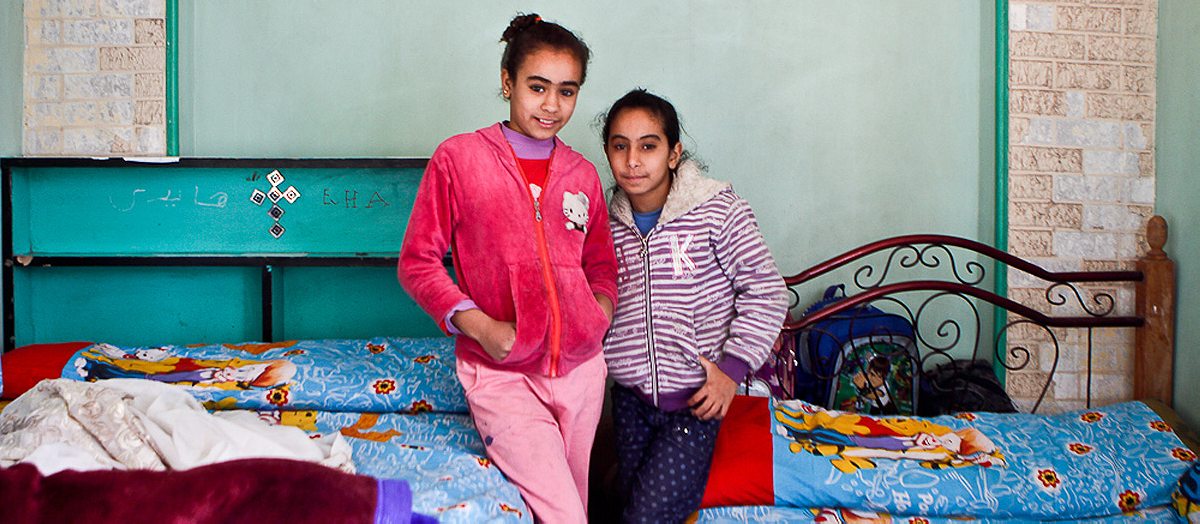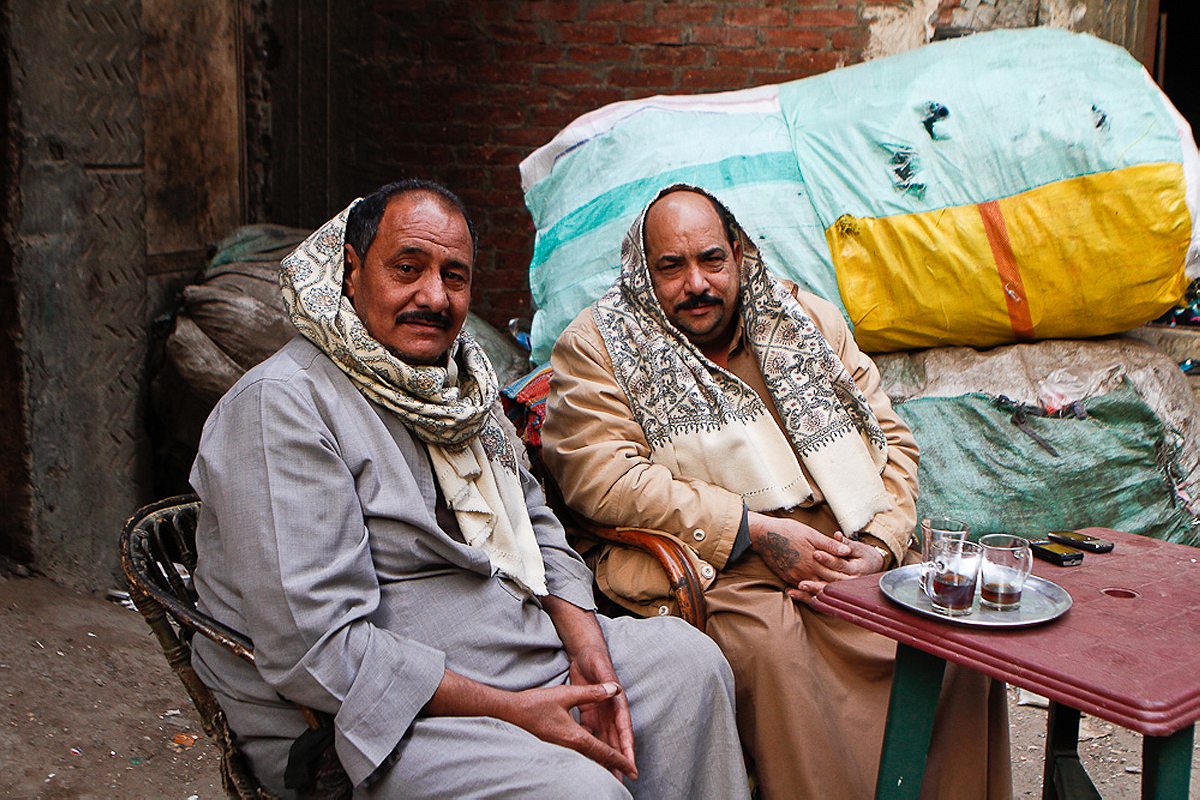Ghazala Irshad finds hope among the refuse in the Christian neighborhood of Garbage City, Cairo.
Sanaa Malik is humming while she makes her way through her work sorting the piles of garbage that line the dirt pathway leading to her apartment building. She is one of the 50,000 or so zabbaleen (trash collectors) who live in the sprawling Garbage City neighborhood under the Moqattam Cliffs on the edge of Cairo. In the lap of her floral-print abaya, with her bare hands, Sanaa, 34, deftly separates plastic, glass, metal, and paper waste from fruit and vegetable peels and other food scraps to be fed to the variety of livestock her family raises on the roof of a shorter, adjoining building. Her 11-year-old daughter Heidi is sorting at her side but then stops and leads me up the littered stairwell to the roof in order to gleefully reveal a secret: their animal farm even includes pigs, prohibited by law since the government slaughtered most of them in order to clean up the area under the pretense of the H1N1 virus scare in 2009.
Once sorted, the cracked koshary containers, sticky soda bottles, dented cooking oil cans—any nonfood items—are stored in the building’s garage to be later shredded, melted, burned, and sold in bulk for profit by Sanaa’s brother-in-laws. They are the ones who collected all this trash from homes throughout Cairo with their own pickup trucks at nominal cost to residents, and almost no cost to the government.

Garbage City is the kidney of Cairo, a vital organ with a dirty job: clean, sort, and repurpose the dregs of the city. So you might expect a fair share of misery here. But not so, especially not today. Because today is Christmas Eve (January 6 by the Orthodox calendar), and almost all of the zabbaleen in this predominately Muslim metropolis are Coptic Christians. After migrating from southern Egypt looking for work, they began pig farming (a trade Muslims steer clear of because pigs are considered unclean in Islam) and initially collected organic waste as fodder before turning to the namesake trade of Garbage City: recycling for profit.
Sanaa’s husband, Antar, 39, comes home from work (he’s a treasurer at a local environmental group), having bought enough pork, beef, and eggs to feed 18 relatives after Midnight Mass. It’s a big event, not least because Copts—the Orthodox Christians who say they make up some 10 percent of Egyptians—have been on a strict Lenten diet (vegan except for fish) for the past 43 days. Christians elsewhere might recognize a 40-day diet that corresponds with the 40 days Moses fasted before receiving the Ten Commandments. But Copts add three extra days to commemorate the 10th century miracle in which Saint Simon the Tanner lifted the mountain the zabbaleen live on as a test of faith.

Besides grocery shopping, Antar has been keeping an eye on new clothes for the younger three of his four children. In a community that subsists solely on the principle of recycling, there is at least one new item that enters every young zabbal’s possession each year, in keeping with Coptic tradition: a new outfit to wear to Christmas Mass. Often it’s the only gift their parents can afford, forgoing presents for adult relatives. Money is especially tight this year, Antar says, because of Egypt’s shaky economy.
Sitting in their home, his 15-year-old daughter Irene’s eyes widen in panic when Antar teasingly assures that he has already bought her a dress in the latest fashion. “She will go downtown with her friends and pick out her own tomorrow,” he finally tells me in front of her, and she exhales back into their oversized red and gold jacquard-patterned couch.
A vivid Berber rug covering the spotless white tile floor has replaced a shabbier rug that was there just the day before. Antar explains that he buys a new one every Christmas “because no matter what we do, it’s still hard to keep our home clean.” He waves toward the shoes we removed outside the door. His daughters Irene and Heidi have the same pride in their residence, showing me their decorating skills on their bedroom walls: Rainbow lights draped between cartoon stickers, a Santa mask, nativity scene paintings, and their parents wedding photo.

There is a pride, also, in their livelihood here. Sanaa’s brothers and their fellow zabbaleen—men, women, and children—generate income for themselves by recycling an astonishing 80 percent of the several thousand tons of trash Garbage City takes in each day. That’s a higher rate than even the most formally organized programs in Sweden and Switzerland, whose recycling rates are closer to 50 percent. The zabbaleen’s success is due to their being not only industrious but efficient—forming specialized, family-run mini-enterprises: paper or plastic, tires or rags.
By sunset, Sanaa has joined Antar’s mother and her sister-in-laws in a makeshift open kitchen at the back of the dark, garbage-filled garage. The aromas of garlic tomato sauce (pureed in a blender salvaged from the trash), beef stewing on the rusty stove, and toasted flatbread (all ingredients for fatta) combine to overpower the foul odor just yards away.
With only a couple hours before Mass and several hours before they can break their fasts, the men distract their stomachs with tea and sheesha in the outdoor cafes. Boys play with firecrackers and girls prance around in their new clothes. In Garbage City, the atmosphere is carefree and relaxed.

The mood among Copts in other predominantly Christian areas of Cairo is far more bittersweet, with much handwringing over their future status and safety under Egypt’s Islamist-dominated government.
“There is no spirit of Christmas this year, not even the spirit of revolution that held us together last year,” baker Magdy Yousef said on his way home from picking up his kids at school in Shubra. “The brothers [shorthand for Muslim Brotherhood] stole everything from us.”
Inside a church in El Daher, a woman named Mariam, who was too afraid to give her last name, whispered that she was praying for the same thing for the third year in a row: “Safety in our streets, our houses of worship, and our homes. That goes for all Egyptians, of course, but mostly Copts.”
Fear is the last thing on anyone’s mind.
But here in Garbage City, fear is the last thing on anyone’s mind. You might not envy them living as they do, huddled together beneath this mountain on the edge of Cairo, their homes alongside the garbage that is their livelihood. But there is an enduring strength in the insularity of Garbage City, particularly in hard times. “Copts have been persecuted for centuries,” says Rasheed Ishaaq, a 55-year-old zabbaleen drinking tea with his neighbors in front of his home in Garbage City, swatting the air at the mention of the new constitution. “Nothing will change that anytime soon. We’ve always trusted God to protect us.”
“And at least here, we’ll always have each other,” Rasheed grins and slaps his friend on the back. “And the garbage, of course.”